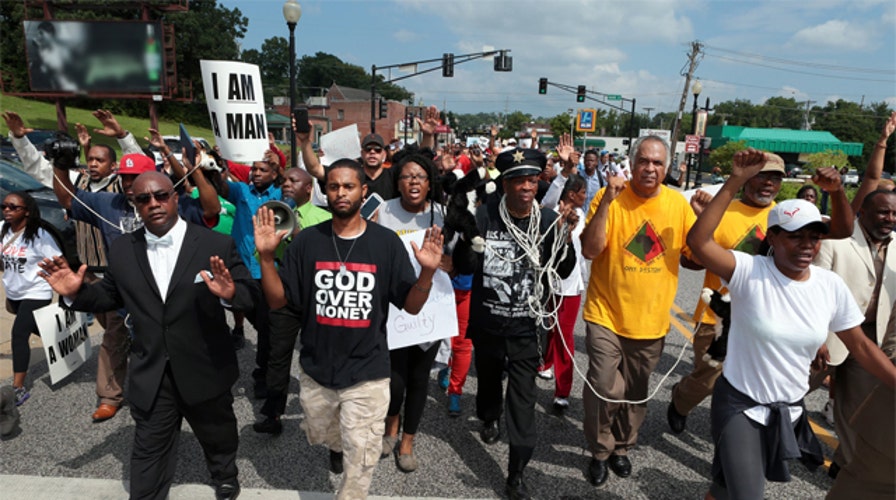A small number of arrests were reported in the St. Louis suburb of Ferguson, Mo. Saturday, though there were fewer confrontations between police and protesters as the community marked two weeks since an unarmed black 18-year-old was fatally shot by a white officer.
Early Sunday, Missouri Highway Patrol Cpt. Ron Johnson reported that only six arrests had been made after a group of around 100 people had gathered at a McDonald's restaurant and refused to leave. Even so, the number was a far cry from the dozens arrested earlier in the week.
Traffic flowed freely along the West Florissant Avenue commercial corridor near the apartment complex where Ferguson officer Darren Wilson shot Michael Brown six times in the middle of the street on Aug. 9.
But once again, peaceful daytime protests gave way to angrier shouts and more defiant marchers as night fell -- including some who argued angrily with one another. But well past midnight, there were no sign of the police riot gear, tear gas or armored vehicles that marked earlier street skirmishes in the first week after Brown's death.
Earlier Saturday, a diverse group of protesters -- many of them children -- marched peacefully alongside community activists and uniformed police as calm largely prevailed for a fourth straight day in north St. Louis County.
"I think some of the frustration is dying down because more information is coming out," said Alana Ramey, 25, a St. Louis resident who joined the afternoon march. "I think there is more action going on. People are being more organized and that is helping."
The protesters included a dozen students and recent graduates of Harvard University who arrived in Ferguson after a 20-hour drive. The Harvard contingent chatted amicably with Missouri Highway Patrol Capt. Ron Johnson, who commended their passion and encouraged them to remain civically active.
"When we go back to our communities, there's a Ferguson near us," said the Rev. Willie Bodrick II, 26, of Roxbury, Massachusetts, a youth minister and recent graduate of Harvard Divinity School.
The images of well-armed suburban police officers confronting protesters in Ferguson with tear gas and rubber bullets after the Aug. 9 shooting of Michael Brown by Ferguson Officer Darren Wilson prompted widespread criticism of how local law enforcement agencies have used federal grants to obtain military gear from the Pentagon.
President Barack Obama ordered the White House to conduct a review of those programs after calling for more separation between the nation's armed forces and civilian police.
The federal government also has launched its own investigation into the shooting, sending dozens of FBI agents to Ferguson to question witnesses. The St. Louis County prosecutor has convened a grand jury to begin hearing evidence in the case and to decide whether to indict Wilson in the shooting.
About 10 miles south of Ferguson, supporters of Wilson rallied at a sports pub owned by the family of Mark Rodebaugh, a 21-year veteran of the St. Louis police department. Rodebaugh said he wanted to have the event because Wilson's name has been "dragged through the mud." He said it felt good to see supporters who weren't either officers themselves or relatives of officers.
"We've got a hard job to do," he said. "We want people to know they shouldn't give up on law enforcement."
Wilson has not spoken publicly since the shooting. He has been on paid administrative leave and reporters have not been able to contact him.
Earlier Saturday, Normandy High School, which Brown attended, observed a moment of silence for him at the start of a home football game.
"This is something we shouldn't forget," said Donald Vaughan Cross, 77, a Hanley Hills resident whose grandson played for opposing team, Lift for Life Academy Charter. "This is something that should be on the minds of everybody -- young ones and old ones. And the old ones like myself, we remember. It's still going on. When is it going to stop? When is it going to end?"
The Associated Press contributed to this report.


